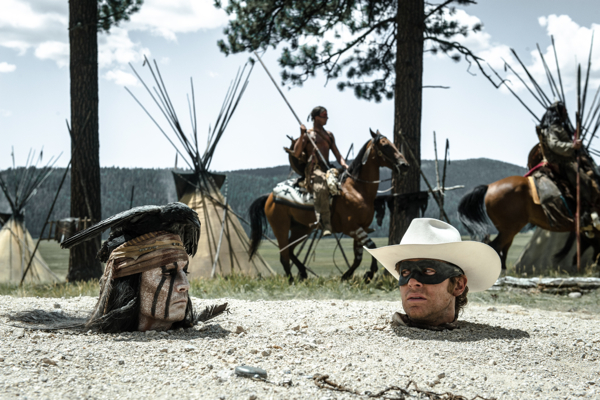Movie review by Greg Carlson
Following his radio debut on Detroit’s WXYZ in early 1933, the Lone Ranger has enjoyed widespread American cultural popularity with children and adults, branded in film serials, novels, television shows, animated cartoons, comic strips, comic books, records, toys, and even a video game. From his ever-present disguise to his supply of silver bullets – a visual reminder that life is precious and the gun should only be fired when absolutely necessary – the Masked Man contributed to the American lexicon several enduring, iconic tropes of justice, honesty, and moral absolutism. Gore Verbinski’s new film retains John Reid’s square jaw and square comportment, but also slathers it with so much mugging, buffoonery, and slapstick that lighthearted irony is transformed into derisive cynicism.
One of the tenets of the Lone Ranger’s creed suggests that God put the firewood there, but that every man must gather and light it himself [sic]. If one applies this notion to the Gore Verbinski, Johnny Depp, and Jerry Bruckheimer interpretation of the legend, the filmmakers collected soggy, substandard kindling and poured the gasoline when it wouldn’t light. For everything that project initiator Depp does right, several things go very wrong. Aside from Tonto, Native Americans are on hand for some old-fashioned combat with the U.S. Cavalry, and Verbinski treats the slaughter as part of the “fun,” don’t-think-about-it spectacle. Women don’t have it any better. Only two females have significant speaking roles (no, they don’t talk to one another) and the majority of other women glimpsed as background extras play frontier prostitutes.
Depp’s dubious, disputed, and longstanding claim that he has some Native American heritage in his family bloodline is mentioned in Daniel D’Addario’s recent “Salon” essay, a sharply written and convincingly argued consideration of the legacy of Tonto in terms of racial and ethnic stereotyping, the false claims of “honoring” marginalized cultures, and the pervasive Hollywood practice of casting white performers in roles that could and should be inhabited by actors of color. Undoubtedly, it is not Depp’s intention to ridicule or demean American Indians no matter how loopy his character design (the plan is assuredly the very opposite), but as D’Addario notes, the actor still uses the Jay Silverheels brand of grammatically infantilizing pidgin English devoid of most definite articles, missing an opportunity to truly re-imagine Tonto in a new century.
Eighteen years ago, Johnny Depp starred in another movie featuring an unlikely partnership between a white, fledgling cowboy and a savvy First Nations “guide.” In Jim Jarmusch’s “Dead Man,” Depp appeared as the uncoordinated tenderfoot from Cleveland who learns to speak through his weapon on a foreboding journey toward death. The great Gary Farmer played Nobody, a half Blood, half Blackfoot outcast (whose tribe-less status parallels Tonto) with an impressive and adequately explained fluency and command of four languages. It may be unfair to compare a black & white indie with a Disney juggernaut (there are no “Dead Man” Lego sets, although there should have been), but if one wants to see how a non-Native filmmaker explodes the traditional stereotypes of American Indians in the movies, you have to watch the one where Depp is the white man.
Finally, when the William Tell Overture sounds and the film’s most impressive sustained action set piece gets underway – complete with some double-steam locomotive chase hjjinks and massive trestle explosion that pay direct tribute to Buster Keaton’s “The General” as reverently as Depp plays Tonto as a nod to the Great Stone Face himself – “The Lone Ranger” hints at the kind of fun we should have had during the rest of the labored, stiff, blow-by-blow. Too much of what remains calls to mind the horrors of Barry Sonnenfeld’s joyless, phony “Wild Wild West” and is as artistically nourishing as the seed Tonto insists on feeding to the desiccated crow perched on top of his head.
